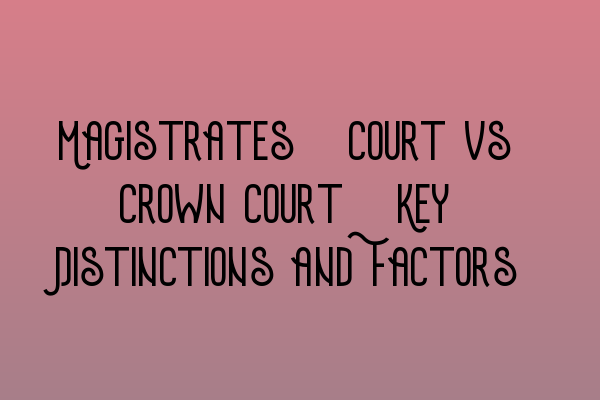Magistrates’ Court vs Crown Court: Key Distinctions and Factors
When it comes to the criminal justice system in the United Kingdom, two main courts handle trials: Magistrates’ Court and Crown Court. Each court has specific roles and powers, and understanding the differences between the two is crucial for anyone involved in or interested in criminal law.
Magistrates’ Court
Magistrates’ Court is the lower court in the UK judicial system, dealing with less serious criminal cases. Magistrates’ Court consists of a panel of three magistrates or a district judge who presides over the trial. These magistrates, also known as justices of the peace, are not legal professionals but community volunteers who are trained in the law.
Magistrates’ Court hears a wide range of criminal cases, including minor offenses such as traffic violations, common assaults, and theft under a certain value. The court also conducts preliminary hearings for more serious offenses before transferring the cases to the Crown Court for trial.
The key advantages of Magistrates’ Court include its cost-effectiveness, efficiency, and accessibility to the general public. The majority of criminal cases are dealt with in Magistrates’ Court, providing a relatively quicker and less formal process compared to Crown Court.
However, it’s important to note that Magistrates’ Court has limited sentencing powers. They can impose fines, community orders, and shorter prison sentences. For more serious offenses, the case must be sent to the Crown Court for trial and sentencing.
Crown Court
Crown Court, on the other hand, is responsible for more serious criminal cases, including indictable offenses such as murder, rape, and robbery. It is presided over by a judge and is usually conducted with a jury of 12 individuals who determine guilt or innocence.
Unlike Magistrates’ Court, Crown Court follows a more formal process and allows for legal representation by solicitors and barristers. The cases presented at the Crown Court involve complex legal issues and often require extensive examination and cross-examination of witnesses.
The sentencing powers of the Crown Court are much broader than those of Magistrates’ Court. The court can impose longer prison sentences and has a wider range of sentencing options, including life imprisonment for the most serious offenses.
Due to the complexity of the cases and the involvement of legal professionals, Crown Court trials tend to be lengthier and more expensive than those in Magistrates’ Court. However, the Crown Court provides a higher level of scrutiny and allows for a fairer, in-depth examination of the evidence presented.
Conclusion
In summary, Magistrates’ Court and Crown Court have distinct roles and powers within the UK criminal justice system. Magistrates’ Court handles less serious cases and provides a cost-effective and accessible approach. Crown Court, on the other hand, deals with more serious offenses, ensuring a more rigorous and comprehensive examination of the evidence.
Understanding the key distinctions and factors between the two courts is essential for individuals involved in criminal law cases. Whether you are facing a minor offense or a serious charge, seeking legal advice from a qualified solicitor is crucial to navigate the intricacies of the court system effectively.
If you require legal representation or advice for your criminal case, consider Legal Representation for Delaware LLCs in the UK: Expert Advice. For a deeper understanding of the British legal system, check out UK Criminal Law: An In-Depth Analysis of the British Legal System. Additionally, if you are facing legal challenges as a UK business in the United States, these Strategies for Overcoming Hurdles may be helpful.
